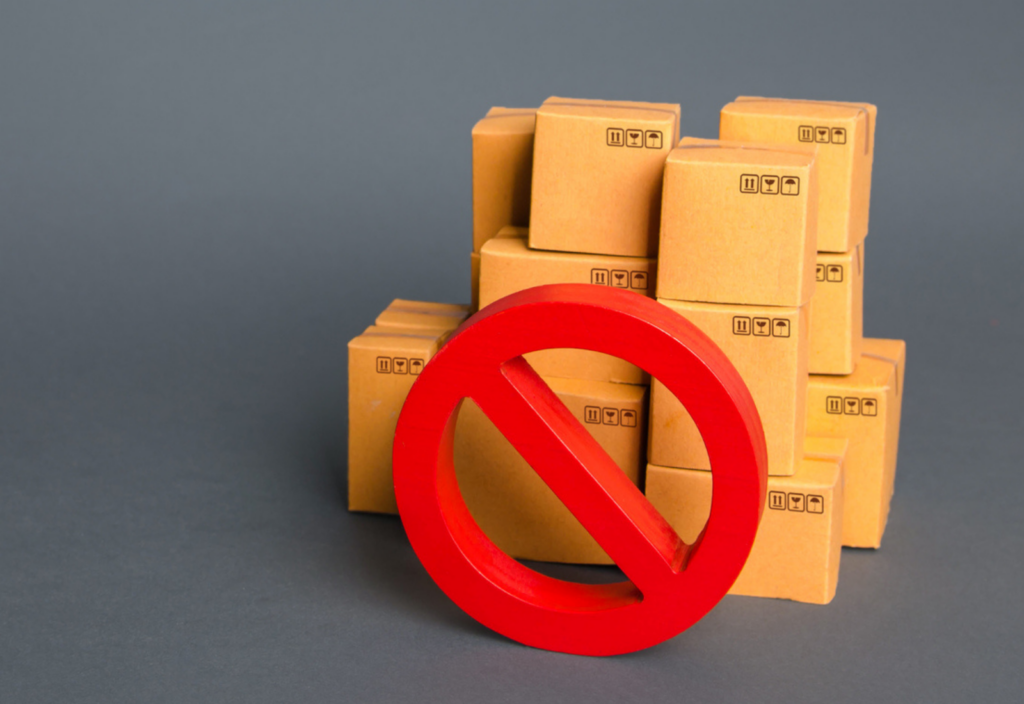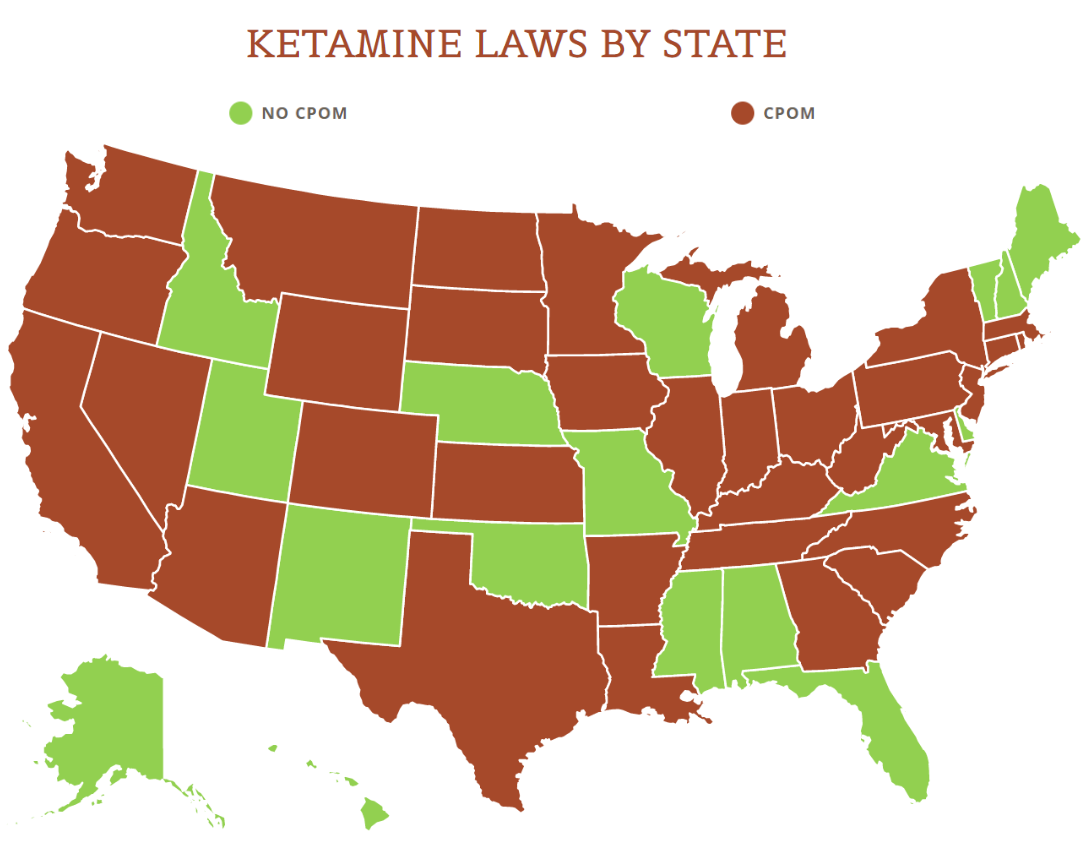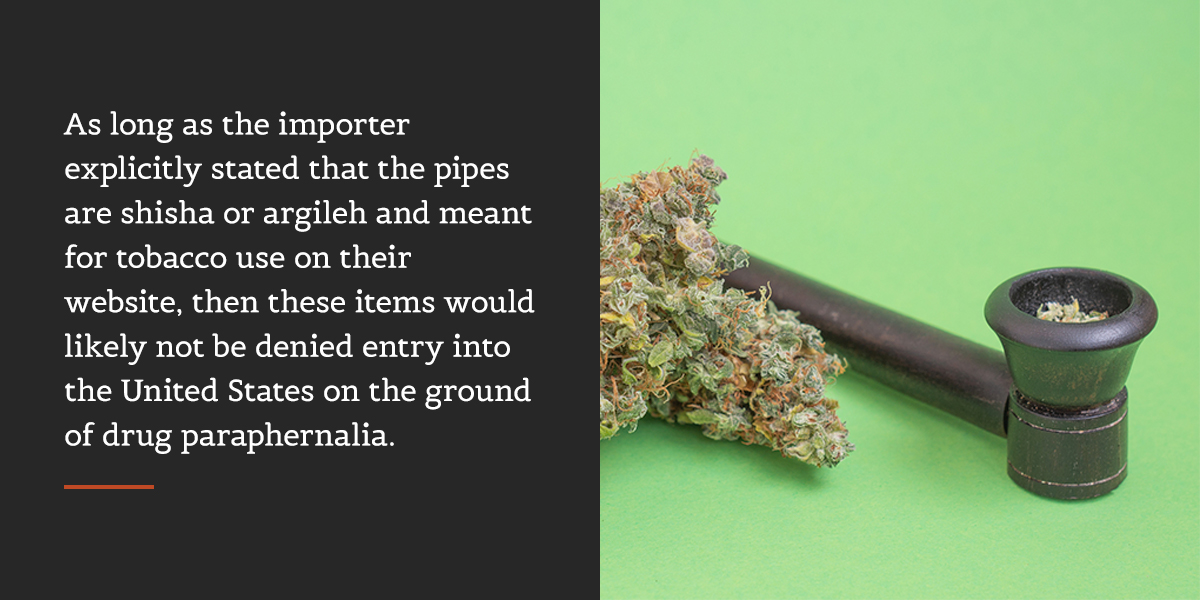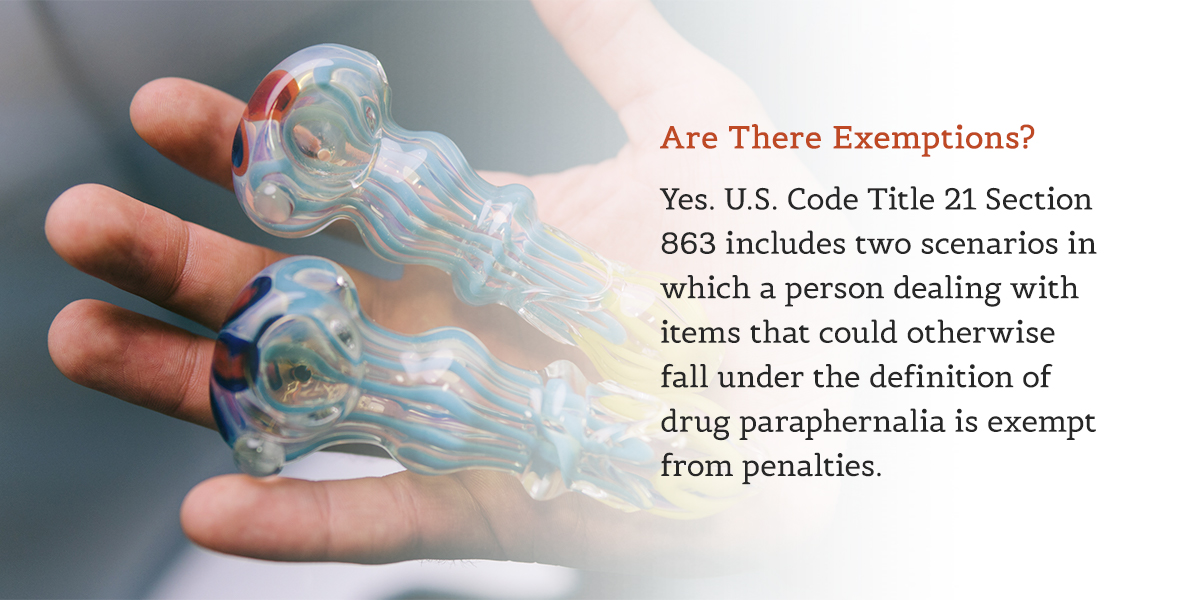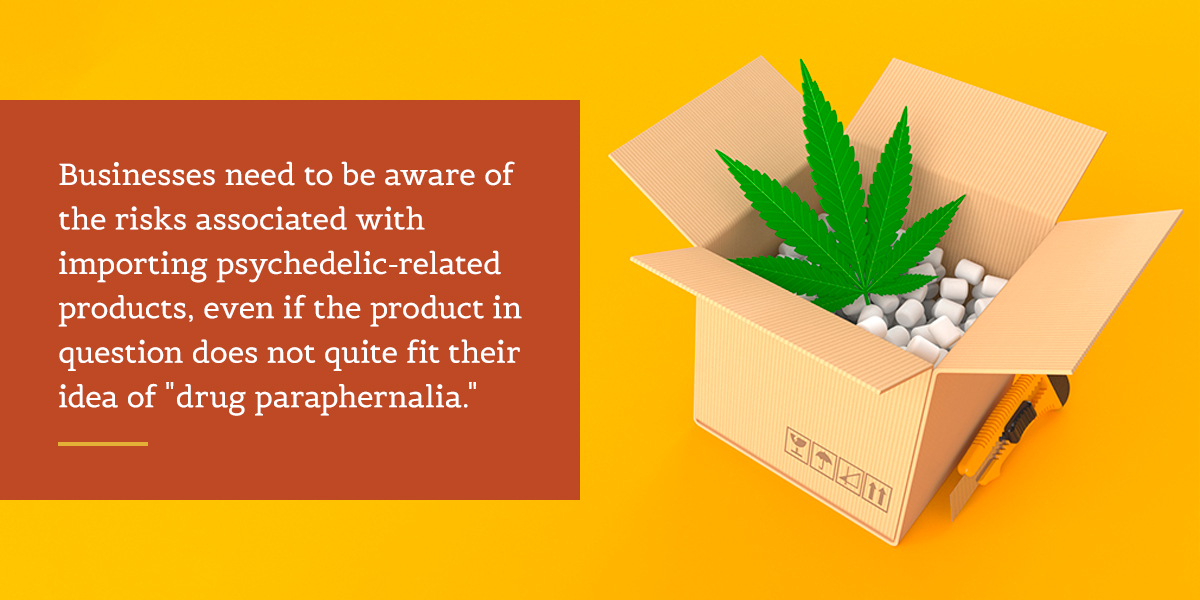Importing drug paraphernalia is illegal under the federal Controlled Substances Act (CSA). However, the expansive definition of “drug paraphernalia” can complicate the understanding of what items fit into this category.
Federal agencies, particularly U.S. Customs and Border Protection (CBP), consider many factors when determining if a particular item is unlawful or not. Importers of psychedelic-related products need to be aware of the risks.
The Controlled Substances Act’s Prohibitions
According to U.S. Code Title 21 Section 863, it is “unlawful for any person to (1) to sell or offer for sale drug paraphernalia; (2) to use the mails or any other facility of interstate commerce to transport drug paraphernalia; or (3) to import or export drug paraphernalia.” 21 U.S.C. § 863(a).
In addition to abiding by CSA regulations, importers must also take state laws prohibiting certain activities involving paraphernalia, such as possession, into account.
Any business selling or importing products that the government could deem as part of this category should familiarize themselves with all regulations. Understanding how agencies define “drug paraphernalia” is key to ensuring you are within legal bounds.
View the US Map of Ketamine Legality
Defining “Drug Paraphernalia”
The CSA lists some examples of drug paraphernalia. 21 U.S.C. § 863(d)(1)-(15). While the list is not exclusive, some examples include:
- Water pipes
- Roach clips
- Chillums
- Bongs
- Wired cigarette papers
- Electric pipes
- Carburetion tubes and devices
- Ice pipes or chillers
- Chamber pipes
- Air-driven pipes
- Smoking and carburetion masks
- Miniature spoons
Any item that “is primarily intended or designed for use in manufacturing, compounding, converting, concealing, producing, processing, preparing, injecting, ingesting, inhaling, or otherwise introducing into the human body a controlled substance” is unlawful. 21 U.S.C. § 863(d).
Where an item falls under this definition is sometimes unclear. However, the CSA provides a series of eight factors that agents can consider when determining if a particular item is drug paraphernalia. 21 U.S.C. § 863(e).
These factors include “(1) instructions, oral or written, provided with the item concerning its use; (2) descriptive materials accompanying the item which explain or depict its use; (3) national and local advertising concerning its use; (4) the manner in which the item is displayed for sale; (5) whether the owner, or anyone in control of the item, is a legitimate supplier of like or related items to the community, such as a licensed distributor or dealer of tobacco products; (6) direct or circumstantial evidence of the ratio of sales of the item(s) to the total sales of the business enterprise; (7) the existence and scope of legitimate uses of the item in the community; and (8) expert testimony concerning its use.” 21 U.S.C. § 863(e)(1)-(8).
Can Businesses Import Drug Paraphernalia?
Businesses must be extremely mindful of the items they import. The CSA’s approach means that the same product could be unlawful in some instances and not in others.
An example would be if an importer sourced water pipes from the Middle East. As long as the importer explicitly stated that the pipes are shisha or argileh and meant for tobacco use on their website, then these items would likely not be denied entry into the United States on the ground of drug paraphernalia.
However, agents may define these items as illegal if the importer uses cannabis leaves on the packaging and refers to these water pipes as bongs on their website.
Are There Exemptions?
Yes. U.S. Code Title 21 Section 863 includes two scenarios in which a person dealing with items that could otherwise fall under the definition of drug paraphernalia is exempt from penalties.
The first is “(1) any person authorized by local, State, or Federal law to manufacture, possess, or distribute such items” 21 U.S.C. § 863(f)(1). And the other includes “(2) any item that, in the normal lawful course of business, is imported, exported, transported, or sold through the mail or by any other means, and traditionally intended for use with tobacco products, including any pipe, paper, or accessory. 21 U.S.C. § 863(f)(2).
CBP Will Hit the Dislike Button
As confirmed by its rulings on drug paraphernalia cases, CBP will look everywhere for evidence regarding an item’s use, including the following:
- The manufacturer’s website
- Social media pages
- E-commerce site’s comment sections
So if a satisfied customer shares they use an item for drug purposes in their product review, that could spell legal trouble for the importer and seller.
What Are the Penalties for Drug Paraphernalia?
According to U.S. Code Title 21 Section 863 (a)(1-3), if a business or person were to do one or more of the following with drug paraphernalia, they could face penalties:
- Selling or offering for sale
- Utilizing a “facility of interstate commerce” for transport
- Importing or exporting
A person convicted of participating in one of these offenses could go to prison for up to three years and face a fine under title 18. 21 U.S.C. § 863(b).
Any items involved in the violation of Section 863 (a)(1-3) are subject to seizure and forfeiture. The General Services Administration can then destroy or authorize the use of the drug paraphernalia for “law enforcement or educational purposes by Federal, State, or local authorities.” 21 U.S.C. § 863(c).
Avoiding Trouble
Businesses need to be aware of the risks associated with importing psychedelic-related products, even if the product in question does not quite fit their idea of “drug paraphernalia.”
As importers and sellers, you should do the following to protect your business:
- Recognize the risk: The first step in mitigating risks is acknowledging the possibility that the government could identify your products as drug paraphernalia.
- Control product messaging: Ensure marketing materials and labels are clear about the product’s purpose and intended use.
- Police online postings: Closely monitor cyberspace to identify problematic messaging about your products left by customers or other third parties.
- Ask a law professional: If you have questions about the legality of the items you or your business sells, it is beneficial to ask a professional for guidance and help. Doing so will help you ensure you are not subject to penalty and are within your legal rights.
Turn to Harris Sliwoski to Learn More
Harris Sliwoski takes a tailored approach to every client and case we take on. As an international law firm, we can help you understand your business’s rights and reach your goals. Our process begins with getting to know you and your business so we can determine the best and most effective strategy for helping you succeed. We prioritize a highly collaborative process and keep you informed every step along the way to ensure we are always on the same page.
If you have questions about drug paraphernalia laws or other legal concerns for your business, don’t hesitate to contact us today!










